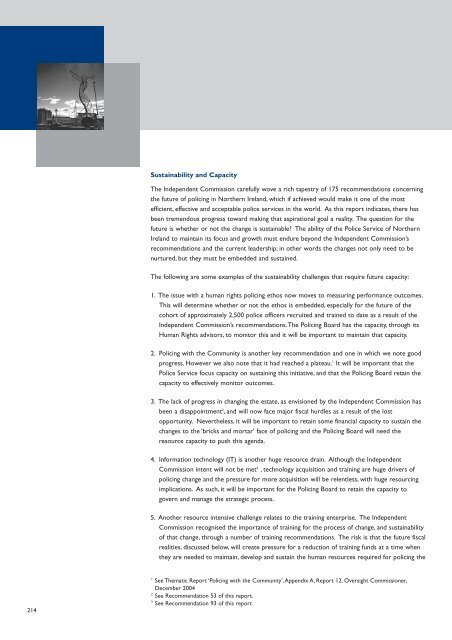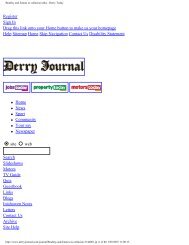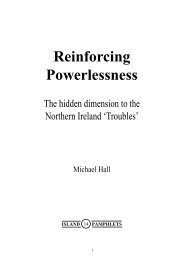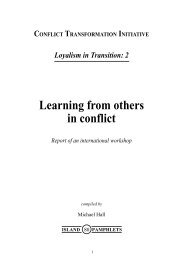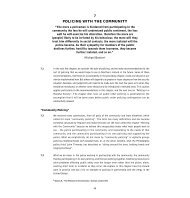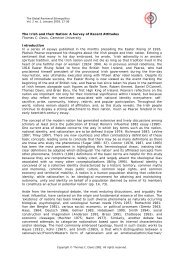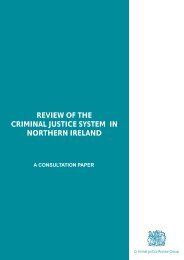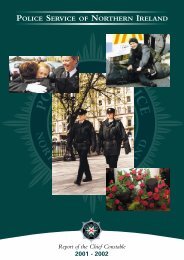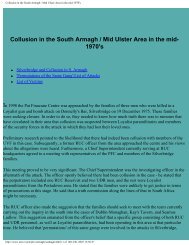11293 report 19 - CAIN - University of Ulster
11293 report 19 - CAIN - University of Ulster
11293 report 19 - CAIN - University of Ulster
You also want an ePaper? Increase the reach of your titles
YUMPU automatically turns print PDFs into web optimized ePapers that Google loves.
Sustainability and CapacityThe Independent Commission carefully wove a rich tapestry <strong>of</strong> 175 recommendations concerningthe future <strong>of</strong> policing in Northern Ireland, which if achieved would make it one <strong>of</strong> the mostefficient, effective and acceptable police services in the world. As this <strong>report</strong> indicates, there hasbeen tremendous progress toward making that aspirational goal a reality. The question for thefuture is whether or not the change is sustainable? The ability <strong>of</strong> the Police Service <strong>of</strong> NorthernIreland to maintain its focus and growth must endure beyond the Independent Commission’srecommendations and the current leadership; in other words the changes not only need to benurtured, but they must be embedded and sustained.The following are some examples <strong>of</strong> the sustainability challenges that require future capacity:1. The issue with a human rights policing ethos now moves to measuring performance outcomes.This will determine whether or not the ethos is embedded, especially for the future <strong>of</strong> thecohort <strong>of</strong> approximately 2,500 police <strong>of</strong>ficers recruited and trained to date as a result <strong>of</strong> theIndependent Commission’s recommendations.The Policing Board has the capacity, through itsHuman Rights advisors, to monitor this and it will be important to maintain that capacity.2. Policing with the Community is another key recommendation and one in which we note goodprogress. However we also note that it had reached a plateau. 1 It will be important that thePolice Service focus capacity on sustaining this initiative, and that the Policing Board retain thecapacity to effectively monitor outcomes.3. The lack <strong>of</strong> progress in changing the estate, as envisioned by the Independent Commission hasbeen a disappointment 2 , and will now face major fiscal hurdles as a result <strong>of</strong> the lostopportunity. Nevertheless, it will be important to retain some financial capacity to sustain thechanges to the ‘bricks and mortar’ face <strong>of</strong> policing and the Policing Board will need theresource capacity to push this agenda.4. Information technology (IT) is another huge resource drain. Although the IndependentCommission intent will not be met 3 , technology acquisition and training are huge drivers <strong>of</strong>policing change and the pressure for more acquisition will be relentless, with huge resourcingimplications. As such, it will be important for the Policing Board to retain the capacity togovern and manage the strategic process.5. Another resource intensive challenge relates to the training enterprise. The IndependentCommission recognised the importance <strong>of</strong> training for the process <strong>of</strong> change, and sustainability<strong>of</strong> that change, through a number <strong>of</strong> training recommendations. The risk is that the future fiscalrealities, discussed below, will create pressure for a reduction <strong>of</strong> training funds at a time whenthey are needed to maintain, develop and sustain the human resources required for policing the2141See Thematic Report ‘Policing with the Community’,Appendix A, Report 12, Oversight Commissioner,December 20042See Recommendation 53 <strong>of</strong> this <strong>report</strong>.3See Recommendation 93 <strong>of</strong> this <strong>report</strong>


